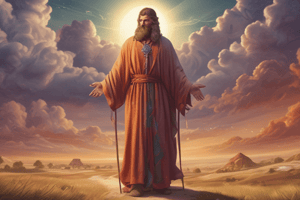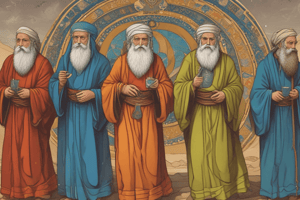Podcast
Questions and Answers
What is a common characteristic shared by prophets and founders?
What is a common characteristic shared by prophets and founders?
- Prioritizing individual freedom
- Receiving divine revelations
- Focusing on material wealth
- Possessing charisma (correct)
What is the term for the process of receiving divine guidance or messages?
What is the term for the process of receiving divine guidance or messages?
- Revelation (correct)
- Visionary experience
- Prophecy
- Charismatic leadership
Which prophet or founder is associated with the Ten Commandments?
Which prophet or founder is associated with the Ten Commandments?
- Moses (correct)
- Jesus Christ
- Muhammad
- Siddhartha Gautama
What is the name of the book translated by Joseph Smith?
What is the name of the book translated by Joseph Smith?
What do prophets and founders often promote?
What do prophets and founders often promote?
What is the name of the faith founded by Bahá'u'lláh?
What is the name of the faith founded by Bahá'u'lláh?
What is a key concept associated with prophets and founders?
What is a key concept associated with prophets and founders?
What do many prophets and founders claim to have had?
What do many prophets and founders claim to have had?
What is a difference between prophets and founders?
What is a difference between prophets and founders?
What is another term for the ability to foresee future events or receive divine guidance?
What is another term for the ability to foresee future events or receive divine guidance?
Who is considered the final prophet in Islam?
Who is considered the final prophet in Islam?
Flashcards are hidden until you start studying
Study Notes
Overview of Prophets and Founders
- Prophets: individuals believed to have received divine revelations or messages from a higher power
- Founders: individuals who established a new religion or religious movement
Common Characteristics of Prophets and Founders
- Charisma: Prophets and founders often possess a strong sense of authority, conviction, and charm that attracts followers
- Visionary experience: Many prophets and founders claim to have had a transformative, revelatory experience that inspired their mission
- Moral leadership: Prophets and founders often promote a new moral code or set of values that guides their followers
- Innovative teaching: They frequently introduce new ideas, interpretations, or reinterpretations of existing beliefs and practices
Examples of Prophets and Founders
- Moses (Judaism): led the Israelites out of slavery in Egypt and received the Ten Commandments from God
- Jesus Christ (Christianity): preached the gospel of love and salvation, and is considered the son of God by Christians
- Muhammad (Islam): received revelations from Allah (God) through the angel Gabriel, and is considered the final prophet in Islam
- Siddhartha Gautama (Buddhism): achieved enlightenment and founded Buddhism, teaching the Four Noble Truths and the Eightfold Path
- Joseph Smith (Mormonism): claimed to have received golden plates from an angel, which he translated into the Book of Mormon
- Bahá'u'lláh (Bahá'í): founded the Bahá'í Faith, emphasizing unity, justice, and the oneness of humanity
Key Concepts
- Revelation: the process of receiving divine guidance or messages
- Prophecy: the ability to foresee future events or receive divine guidance
- Charismatic leadership: the ability of a leader to inspire and influence others through their personal charm and authority
Comparisons and Contrasts
- Similarities: many prophets and founders share similar characteristics, such as charisma and visionary experiences
- Differences: distinct teachings, beliefs, and practices separate each religious tradition and movement
Prophets and Founders
- Prophets: individuals who receive divine revelations or messages from a higher power
- Founders: individuals who establish a new religion or religious movement
Characteristics of Prophets and Founders
- Charisma: strong sense of authority, conviction, and charm that attracts followers
- Visionary experience: transformative, revelatory experience that inspires their mission
- Moral leadership: promoting a new moral code or set of values that guides their followers
- Innovative teaching: introducing new ideas, interpretations, or reinterpretations of existing beliefs and practices
Examples of Prophets and Founders
- Moses: led the Israelites out of slavery in Egypt and received the Ten Commandments from God
- Jesus Christ: preached the gospel of love and salvation, and is considered the son of God by Christians
- Muhammad: received revelations from Allah (God) through the angel Gabriel, and is considered the final prophet in Islam
- Siddhartha Gautama: achieved enlightenment and founded Buddhism, teaching the Four Noble Truths and the Eightfold Path
- Joseph Smith: claimed to have received golden plates from an angel, which he translated into the Book of Mormon
- Bahá'u'lláh: founded the Bahá'í Faith, emphasizing unity, justice, and the oneness of humanity
Key Concepts
- Revelation: the process of receiving divine guidance or messages
- Prophecy: the ability to foresee future events or receive divine guidance
- Charismatic leadership: the ability of a leader to inspire and influence others through their personal charm and authority
Comparisons and Contrasts
- Similarities: prophets and founders share similar characteristics, such as charisma and visionary experiences
- Differences: distinct teachings, beliefs, and practices separate each religious tradition and movement
Studying That Suits You
Use AI to generate personalized quizzes and flashcards to suit your learning preferences.




